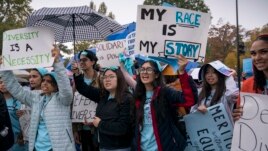29 April 2023
In 1961, President John F. Kennedy ordered businesses working for the U.S. government to treat workers and people applying for jobs "without regard to their race, creed, color, or national origin." He said the businesses should take "affirmative action" to make this happen.
"It was really a recognition that African Americans were excluded from the American dream for many years," said Natasha Warikoo, a sociology professor at Tufts University in Massachusetts.
She added that elite colleges in the United States also wanted to increase the percentage of African Americans and other minorities attending their schools. "And then taking into account race in the admissions process grew," she said.

FILE - Students and activists rally outside the Supreme Court as the court before oral arguments in two cases that could decide the future of affirmative action in college admissions, Monday, Oct. 31, 2022, in Washington. (AP Photo/J. Scott Applewhite)
Today, affirmative action refers to policies designed to increase representation of minorities and women in jobs and in higher education.
Katharine Meyer is with the Brookings Institution, a policy group in Washington, DC. She said affirmative action in higher education has two goals:
The first is to increase the diversity of student populations so that students may learn from more points of view. The second is to give chances to those students who grew up in areas with poor schools and fewer educational resources.
Sixty years later, Americans disagree about affirmative action. Courts have issued rulings on affirmative action. They continue to do so. The U.S. Supreme Court is currently considering two cases arguing that affirmative action discriminates against Asian American students. The justices could ban colleges from admitting students based on their race.
Mike Gonzalez is with the Heritage Foundation, another policy group in Washington. He supports ending affirmative action.
"It really violates all of our ideals," he said. "We're a multiethnic country where it's very important that government, or even the private sector, do not use race to pick and choose who rises and who doesn't rise. And getting into a school is one of the most important rungs in the ladder of success."
Nine states have banned affirmative action based on race. The states include California, Washington, Florida, Michigan and Nebraska. Arizona, New Hampshire, Oklahoma and Idaho also ban the policy.
A study from 2014 aimed to follow an affirmative action ban in a group of states from 1992 to 2004. The study found that its measures of affirmative action decreased by several percentage points in states that banned affirmative action.
Some colleges in those states now use other methods — like admitting students in the top 10 percent of their high school's graduating class.
But Warikoo said there is no way to choose the very best students. She said this is because not everyone agrees on what qualities and qualifications "best" students should have.
"Do we want to have a higher education system that is accessible to people regardless of their class backgrounds or their racial background?" she asked.
Gonzales said there are qualities that do not include race or ethnicity that colleges should look for in students. These may include how much students give to charity, what activities they do, and how much leadership they show.
"Race or category or national background is an awful way to make any choice by government or by the private sector. It should be so obvious to everybody that I don't even understand why I have to explain this," he said.
However, Warikoo worries about possible long-term effects of the Supreme Court ruling against admitting students to schools largely because of their race. "I don't want to be dramatic, but I think it undermines our democracy," she said.
She said that Americans believe education gives people a way to have success and a good life. But, she added, it is a problem if student populations in higher education do not have the same representation as high school students in the US.
The Supreme Court is expected to rule on the future of race-based admissions by June.
I'm Andrew Smith. And I'm Caty Weaver.
Dora Mekouar wrote this story for Voice of America. Andrew Smith adapted it for VOA Learning English.
________________________________________________________________
Words in This Story
creed -n. a set of beliefs or principles that strongly affect the way people live
origin -n. that from which a person or thing has its very beginnings; the root or primary beginning
exclude -v. to not allow inclusion of someone or something into a group or category
elite -adj. available to only a small set of people and/or showing unusually high levels of performance
taking into account -v. (phrasal) to consider or include in one's thinking
points of view -n. mental attitudes, opinions, or perspectives particular to each person or persons
sector -n. an area or category
rungs in the ladder -n. (idiomatic) the steps in a process which help progression towards achievement of some goal or task
accessible -adj. easily reached or obtained
regardless -adv. without taking into consideration
charity -n. the act of giving money to people or organizations in need
awful -adj. very bad
obvious -adj. easily seen, noticed, or understood
undermine -v. weaken